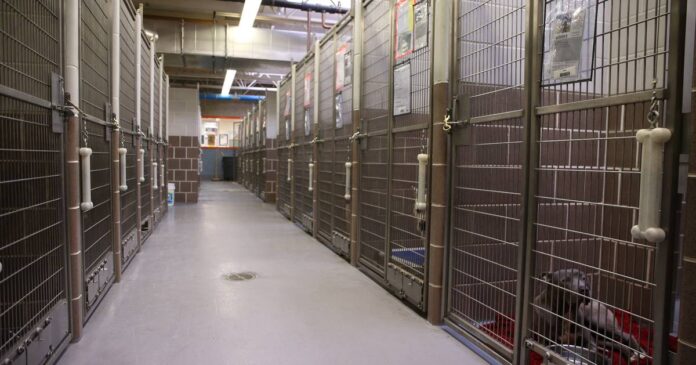Chicago’s city-run shelter is on track to put down more animals in 2023 than it has in years, a reality that the agency’s leader said Wednesday was the result of rising pet care costs as well as owners simply not having time anymore after returning to the office post-pandemic.
Speaking at a City Council budget hearing, Susan Cappello, acting executive director of Chicago Animal Care and Control, acknowledged the “number of challenges” that are facing animal shelters nationwide after multiple volunteers with her department spoke out against current conditions.
“The shelter is really, really sad right now,” one CACC volunteer said during public comment at the hearing. “Those are living animals. They needed a chance. They deserve a chance. And we really need leadership that is really passionate about the animals.”
Cappello later countered to aldermen that “in my eyes, the way I look at it, we’re doing fabulous work right now,” compared with two decades ago, when she said more than 20,000 of about 25,000 animal intakes were euthanized.
She added that the shelter is facing acute constraints after the COVID-19 pandemic.
“During the 2020 pandemic, our shelter was empty. We had maybe 30 dogs and 10 cats. Everybody’s going back to work, and we’re seeming to have people not have time for their pets anymore. People aren’t coming in to adopt. It’s very difficult.”
So far this year, euthanizations are up 24.5% from the same period in 2022 and already surpass annual totals from the thick of the COVID-19 pandemic in 2021 and 2020, according to CACC data.
There have been 1,502 euthanizations through Sept. 30, mostly dogs, while 9,427 total animals have been taken into the shelter this year. Animals euthanized or disposed of by request of the owner are not included.
Cappello said Wednesday the intake volume has shot up to highs not seen since before the pandemic. The 2020 low of 9,814 animals coming into the shelter skyrocketed by 18.8% over the next two years, and is on pace to rise higher still this year.
“Shelters nationwide are currently facing a number of challenges, including CACC,” she said. “The number of animals that the shelter takes in has increased significantly in recent years. This is due to a number of factors, including the economic downturn. And CACC is also facing rising costs. The cost of food, veterinary care and other supplies has increased significantly in recent years.”
Still, Cappello said there are positives in her department’s mission as it adjusts to the new environment. Most animals do get adopted or transferred to another shelter, while mobile clinics to spay, neuter or vaccinate pets are seeing increased success.
Ald. Raymond Lopez, 15th, called for expanding the traveling clinic as wards like his deal with an “unchecked animal crisis.”
“I think we can all agree that it is a crisis where we see the abandoned animals running loose,” Lopez said. “But I think at the end of the day, it’s all about education and making sure the services to help provide the medical procedures in communities where I think we really have to focus.”
CACC’s proposed budget for 2024 is $7.7 million, a roughly $670,000 increase from this year but without any new full-time positions. Ald. Brendan Reilly, 42nd, said that needs to change in the future.
“Yours is a department that is consistently underfunded and relies very heavily upon volunteer work,” Reilly said. “But you need more professional staff and we need a bit more real estate. You have a very difficult job and housing these animals. The volumes are huge.”




